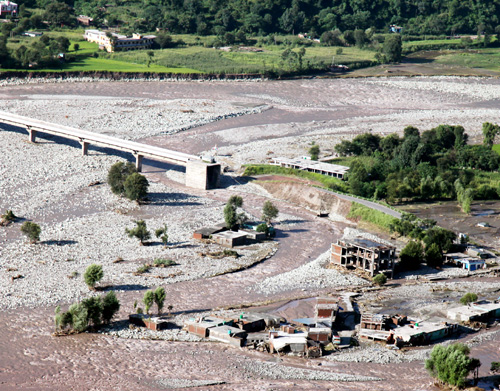Basharat Hussain Shah
Prime Minister Narendra Modi this Diwali in flood-hit Srinagar.”Will be in Srinagar on Diwali, 23d October & will spend the day with our sisters & brothers affected by the unfortunate floods,” he tweeted.
By the time the news reached twelve-year old Nagina Koserand her family residing in the village Bariari in Mandi tehsil of border district Poonch, Diwali was over and their wish to share their grief with the Prime Minister remained unmet. He announced a package of Rs 175 crore for renovation of six major hospitals and Rs 570 crore for rebuilding homes damaged in the recent floods in Jammu & Kashmir. It left Nagina’s family doubtful of whether, like the PM, the funds would reach their isolated village.
“On the morning of September 5, 2014 it was raining heavily when we were waiting inside our house. We were thirteen members sitting together, unaware of the misfortune that was about to strike our lives. We heard a very loud sound, like a blast, and some of us jumped out of the window. I fell and became unconscious. When I regained consciousness, my entire house was gone. There was only mud and water. Of the thirteen members, three had died and everyone else was seriously injured. I cried for help and became unconscious again,” remembers fifty-five year old Mohammad, Naib Sarpanch of the village and grandfather of Nagina.
Nagina Koser was injured with tin sheets wounding her right leg up to the knee. “I have collected money from relatives and other people for my daughter’s treatment. She has been admitted to Government Medical College, Jammu as I have not received any help from the administration for her treatment,” rues Nagina’s father, Javed Iqbal, who works as a labourer in Poonch.
“The Government has compensated one lakh fifty thousand rupees for the deceased members but what about those injured seriously in the disaster?” asks another member, twenty eight-year old Imran Khan, who still cannot believe that his parents and wife are no more. He has been in shock since news of their death trickled in during the floods.
“We have spent ninety thousand rupees on Nagina’s treatment and a lot more is required. We also need money to rebuild our house and start our lives from scratch. We have temporarily shifted to our relative’s house but that is not the solution,” rues Imran, explaining that their only sources of livelihood were agriculture and livestock – both of which have been washed away.
The Government survey shows that 594 concrete houses and2008 kacha houses are totally damaged while 448 concrete houses and 3788 kacha houses are partially damaged.
Besides, around 211 shops are fully or partially damaged while 28369 kanals of land havebeen affected by flash floods.
The figures about the loss of public assets show that about 28 school buildings have been totally damaged and 165 others are partially damaged, out of which 9 buildings have been declared as unsafe.
In Poonch alone, 28369 kanals of land have been affected by flash floods with no estimated figure of loss of livestock available as yet. So far, no compensation has been announced for the damaged crops and livestock – the very basis of survival of the rural people. And as for the compensation announced for the dead and the injured, sceptics abound as to its disbursement.
Almost every family in the rural belt of Poonch shares the same griefas this family. This border district located in the lap of the mighty Pir Panjal Range was already labelled one of the most backward districts of the state. Based on the assessment of flood damages conductedby the Government, Poonch now has the dubious distinction of being the worst-affected district in the Jammu region, with massive devastation of public and private property, besides loss of several lives.
In recent months, Poonch has been in the news for the ceasefire violations disturbing the fragile peace process. Barely remembered in the reportage are the people whose everyday lives are interrupted, who, since the mayhem of the 1940s, are keen to leave behind the violent history of cross-border conflict that has plagued the region for over six decades. Today, the picturesque mountains of the Pir Panjal Range stand mute witness to another destruction of colossal magnitude – except this time it was triggered by forces beyond the people’s control. The people of Poonch have been totally isolated.Even the Prime Minister visiting the State returned from the city itself,giving the people of Poonch a feeling that they have been left unheard, once again.
(The author is a final year student at Govt. Degree College, Poonch)
Charkha Features


